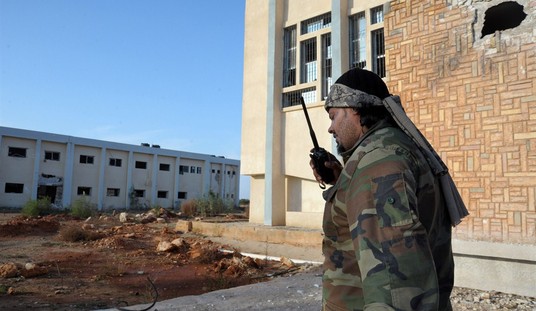Seymour Hersh’s expose in the London Review of Books, which the Washington Post allegedly refused to publish accuses Barack Obama of lying about the Syrian chemical weapons attack which nearly triggered a US attack on Assad. Hersh makes two key assertions:
First, Obama retroactively cooked up the narrative that the Assad regime was responsible for the infamous sarin attack on civilians in Eastern Ghouta. Second, that the rebel al-Nusra Front, a jihadi faction of the rebel alliance, might plausibly have been the real culprits.
Obama altered the sequence of what he knew and when he knew it, making it appear as if he was following an unfolding atrocity instead of reconstructing it from hindsight, in order to add to the drama. More importantly, he minimized the possibility of that al-Nusra and the other Jihadi factions might have been the actual perpetrators in this case because, Hersh strongly suggests, he was eager to frame Assad.
A former senior intelligence official told me that the Obama administration had altered the available information – in terms of its timing and sequence – to enable the president and his advisers to make intelligence retrieved days after the attack look as if it had been picked up and analysed in real time, as the attack was happening. The distortion, he said, reminded him of the 1964 Gulf of Tonkin incident, when the Johnson administration reversed the sequence of National Security Agency intercepts to justify one of the early bombings of North Vietnam. The same official said there was immense frustration inside the military and intelligence bureaucracy: ‘The guys are throwing their hands in the air and saying, “How can we help this guy” – Obama – “when he and his cronies in the White House make up the intelligence as they go along?”’
Hersh might of course be entirely off-base, his sources misinformed; or perhaps the veteran journalist is making up his expose out of whole cloth. But that is what the news cycle of the next few days will focus on: the question of whether the president lied to the world — to the point of using military force on false pretenses — in order to advance a political agenda.
If the past is any guide, Hersh’s accusations will be overtaken by whatever new scandal is waiting in the wings. The president seems to have an endless supply of them. It will join the long list of unsolved mysteries, including but not limited to the puzzle of Benghazi, the IRS crackdown on conservative political organizations, the wiretapping of an entire AP press bureau; the inexplicable billion dollar Obamacare website that still doesn’t work; the question of whether his deal with Iran is just a setup and much, much more.
But while it lasts the Hersh expose is interesting. The most striking thing is what it says about the presidential decision making process. Obama apparently begins with a narrative for which facts are found a posteriori. The narrative then turns into a runaway freight train that drags all along with it.
On 30 August it invited a select group of Washington journalists (at least one often critical reporter, Jonathan Landay, the national security correspondent for McClatchy Newspapers, was not invited), and handed them a document carefully labelled as a ‘government assessment’, rather than as an assessment by the intelligence community. The document laid out what was essentially a political argument to bolster the administration’s case against the Assad government.
In the case of Syria insiders began to worry about where this was going. One overt worrier was the Chairman of the Joint Chiefs. “There is evidence that during the summer some members of the Joint Chiefs of Staff were troubled by the prospect of a ground invasion of Syria as well as by Obama’s professed desire to give rebel factions non-lethal support. In July, General Martin Dempsey, chairman of the Joint Chiefs, provided a gloomy assessment, telling the Senate Armed Services Committee in public testimony that ‘thousands of special operations forces and other ground forces’ would be needed to seize Syria’s widely dispersed chemical warfare arsenal, along with ‘hundreds of aircraft, ships, submarines and other enablers’.”
Those worries only slowed but did not stop the train. The refusal of the British parliament provided another speed bump but the juggernaut had still not stopped. Then something happened, whose character puzzles Hersh so much that it is the key riff in his piece; something that changed Obama’s calculus over the entire Syrian sarin incident. Hersh writes that after being so eager to attack Obama then changed direction so swiftly the evolution seemed to come almost from nowhere:
The administration’s distortion of the facts surrounding the sarin attack raises an unavoidable question: do we have the whole story of Obama’s willingness to walk away from his ‘red line’ threat to bomb Syria? He had claimed to have an iron-clad case but suddenly agreed to take the issue to Congress, and later to accept Assad’s offer to relinquish his chemical weapons. It appears possible that at some point he was directly confronted with contradictory information: evidence strong enough to persuade him to cancel his attack plan, and take the criticism sure to come from Republicans
Was Obama deflected from his attack on Assad by the refusal of the UK to go along? Or was there something else?
We now know that Obama, even as he beat the drum of war against Assad, was secretly negotiating with the Iranians on a deal to roll back the sanctions. He was talking to Assad’s patrons even as he was presenting his war talking points to journalists against the Syrians. “Israel found out about the existence of secret talks between the United States and Iran months before they were officially informed of the negotiations by the U.S. government, a senior Israeli official told Haaretz.”
The back door contact was set up even before Iran’s June presidential election, the two reports said. Deputy Secretary of State William Burns led the talks on the American side and the first meeting was held in March, while Mahmoud Ahmadinejad was still president, according to the Associated Press.
How could he do both at once?
Two possible explanations suggest themselves. Either the hue and cry over the sarin attack was part of some deep strategy to affect his negotiations with Iran or it represented another track that the president was pursuing in parallel without being aware of the conflict.
That is not entirely impossible. Recently the crown Prince of Bahrain complained that the administration was “schizophrenic”. “In an exclusive interview with The Telegraph, Sheikh Salman bin Hamad al-Khalifa, the Crown Prince of Bahrain, warned that Barack Obama’s administration would lose influence in the region if it persisted with what a ‘transient and reactive’ foreign policy.”
Certainly some elements in Iran regard Obama as so toxic they don’t even want Rouhani in the same room with him. “The funeral service of Nelson Mandela could be a “trap” for Iranian President Hassan Rouhani because he could run into US President Barack Obama, a hardline Iranian daily warned Sunday.”
Hardline newspaper Kayhan warned in an editorial that if Rouhani attends it could bring him face to face with Obama, “head of the Great Satan government”.
“Some domestic and foreign media outlets are using the funeral ceremony as a pretext to push Rouhani towards a meeting with the head of the Great Satan government,” Kayhan said.
If so, the surprising about face that so puzzles Seymour Hersh may simply another Obama screwup. In that scenario, he drew a Red Line in a moment of absentmindedness, got carried away into thinking he might gain politically by attacking Assad, nearly got started on it but remembered he was negotiating with Iran, and when shocked back into wakefulness by the revolt of the British parliament decided to become best buddies with Rouhani.
All in a day’s work for the president who designed Obamacare. And now he’s got a “deal” with Iran and getting ready to destroy some chemical weapons.
The supreme irony in all this however, is that in recompense for his deal with Iran he gets destroy or at least announce the destruction of Assad’s chemical arsenal when it may turn out that al-Nusra was guilty all along. “But what difference, at this point, does it make?”
Did you know that you can purchase some of these books and pamphlets by Richard Fernandez and share them with you friends? They will receive a link in their email and it will automatically give them access to a Kindle reader on their smartphone, computer or even as a web-readable document.
The War of the Words for $3.99, Understanding the crisis of the early 21st century in terms of information corruption in the financial, security and political spheres
Rebranding Christianity for $3.99, or why the truth shall make you free
The Three Conjectures at Amazon Kindle for $1.99, reflections on terrorism and the nuclear age
Storming the Castle at Amazon Kindle for $3.99, why government should get small
No Way In at Amazon Kindle $8.95, print $9.99. Fiction. A flight into peril, flashbacks to underground action.
Storm Over the South China Sea $0.99, how China is restarting history in the Pacific










Join the conversation as a VIP Member